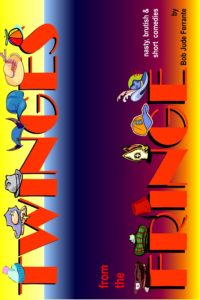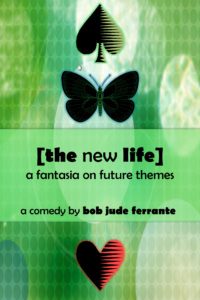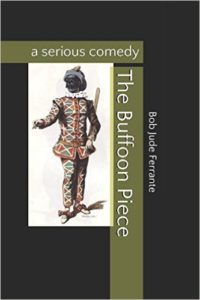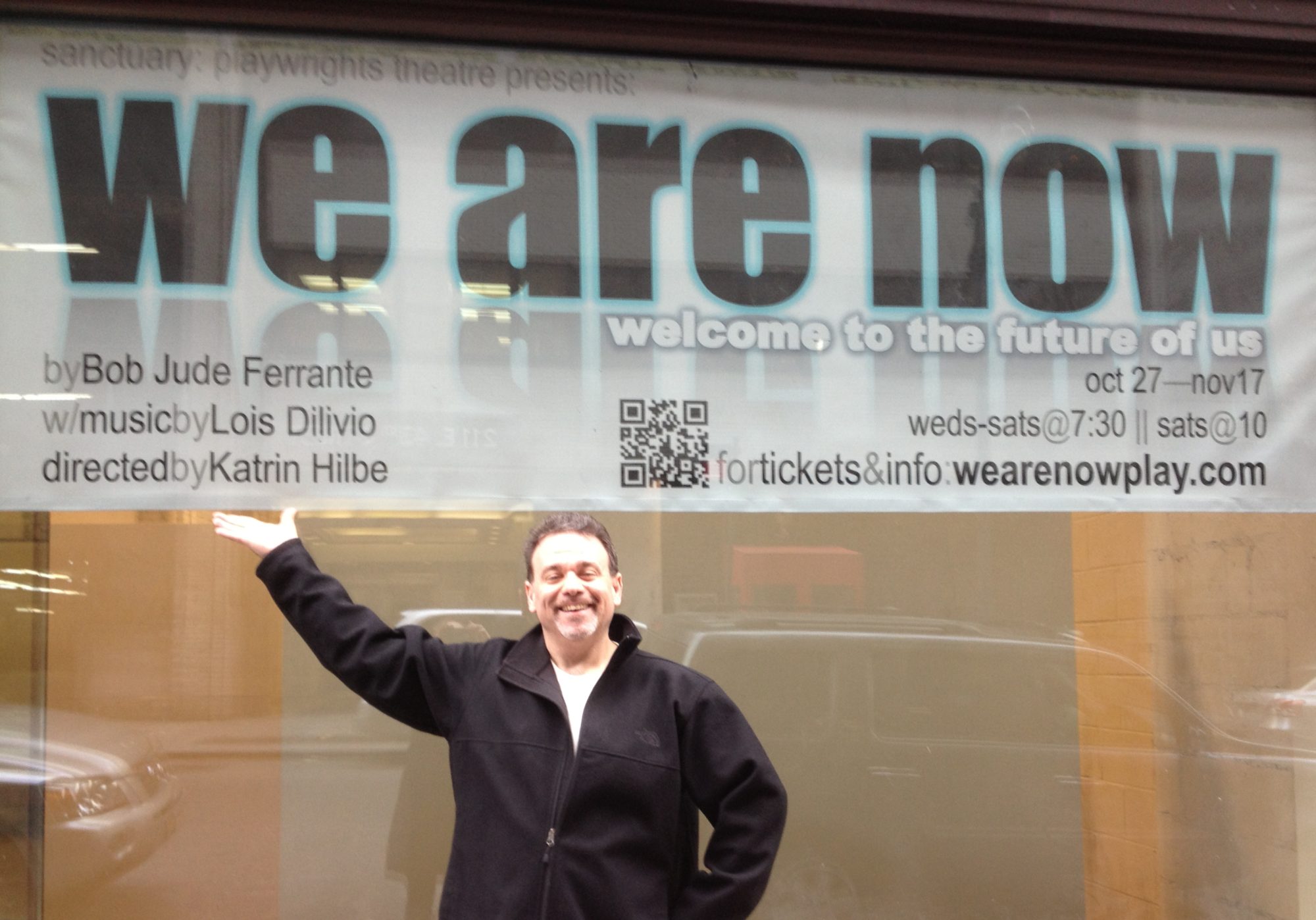What Artists do for Artists (2)
What Artists do for Artists (1)
“Since I know you, if your work isn’t published, send me two, and I’ll fully expose myself to your work, and we are now in touch.
If they are published, I’ll buy two.”
prodigious
Published 2017
Exclusive to bobjudeferrante.com.
[Transmission received at Fermi Gamma-Ray Telescope (Sonoma State University), June 5, 2012, 19:59. The telescope was receiving data from PSR B0531+21, also known as the Crab Pulsar, aspect located in NGC 1952, also known as the Crab Nebula). The data was received as Unicode text, which rendered as English. It repeated exactly 1000 times, for 00:00:33:0000, indicating the same 33 ms periodicity as the pulsar. The possibility this is terrestrial interference data has only a 0.033% likelihood.]
Only want to say this now. Don’t have a lot of time, and I’m sorry for that.
The moment it happened, everything became…
In the shower, the last time there was a shower, which was about how much time ago? Twelve thousand milliseconds ago.
I think. Even then we didn’t use towels. An air vent from the ceiling would blow. Like a, what did we call that? Hand dryer. But for your body. Science fiction films would show this via a beautiful woman, her hair blowing up.
It’s harder to stay with it than it used to be. Stories are still there, but so… it feels like a mantra… twelve thousand seconds! ago?
In that shower I got this idea about evolution. I asked, or my mind anyway asked, why does evolution “like” to be slow?
My mind answered: It “likes” to be slow, because the response time of the environment is slow. The endless stream of relationships; so, so np-hard, that give each element in the environment a chance to live and, for temporal continuance, to reproduce, or not. There is no efficiency gained rewriting the code before feedback. With so, so many variables. Climate change and its effect on the food chain. Geo-events, (volcanoes, earthquakes, continental drift, terrain changes). Cosmic events (radiation bursts, impacts of various astral bodies). Factor in effects of additions to the count and graph of entities and miscellaneous remaining properties of the environment. As variables.
Because that’s how it talks, the mind. Charming in smaller doses, people would say. And they might be right.
It happened the day I took that last shower. I knew it happened because I heard it happen.
Because it played.
We called it The Symphony. Originally the name was supposed to be a joke, a reference to a form of music many of us liked. Used to like.
We orchestrated it hypothesizing we are a simulation. In any P that we are in such a simulation is not zero. So as if reality were fiction, we applied the necessary confirmation bias that would give us a model for change, and turned it into motives and phrases and arias. At that point we no longer needed to question if it was fact. No, we would act as if it were fact. And armed with that as a fact – but I would have to say it started as a hypothesis.
— That’s not how we stated the hypothesis. But just saying how we stated it now, well —
Nobody knows for sure who started playing it. Because of VPNs, because of code obfuscation. Or a miscellany of other countermeasures. You might expect China. Russia. But we know. It was Singapore. Cynics maintain it was to gain some sort of leverage. I think not. Every nation wants something. Singapore wants purity of action. To play The Symphony outweighs not to play The Symphony because it is a finer act. And why not? But it was copyleft, which did even more damage than anything proprietary. Quanda Corporation in Singapore, the ones who played The Symphony, did not consult the UN beforehand. Companies can’t consult the UN about the effects of software. Regardless of the effects it might have on nations. Which used to be. And what response would they have had? Is that even a logical question? Is it better to ask? Forgiveness than permission? Why am I smelling the back of my hand?
The day The Symphony started playing, we went from analyzing our music, dabbling in it, to rewriting it, to composing and arranging it. Smudging out Hodgkins and cystic fibrosis, adding anti-fungal defenses to barley, these little changes were notes. Sometimes, phrases. Aggregate them into longer chains, and you have strains, then cadences, movements and you have it.
There weren’t even that many of us working on it, at the start. Now? Hello world.
That we could just listen, and no matter where we were. And where we all were, well, that also became something else.
It keeps wavering in and out now. Can’t decide if that’s the punch line of the joke or not.
Twelve thousand milliseconds ago there used to be these things called candles, which even though they were supplanted completely in function by digital light, we still made in prodigious numbers. People kept these things in their houses, these useless things, these candles. And they put them on windowsills. On windowsills where a gust of wind could blow a curtain into the flame. And they could do this when everyone was napping, and the entire house could burst into the most enormous…
I was away. The Symphony had conferences at that time. We were discussing how to telescope to years instead of seconds, to manipulate scale. We discussed the ramifications for hours. Interestingly, not a scale of time we discussed. The biggest argument was if Time was discrete or continuous. It took hours (because people like to talk and we try not to interrupt) before it was shown both classical and quantum physics had figured this out sufficiently. We were all laughing at the joke when my tab rang and it was the police calling, at least the type of police we had then, which had cars and guns and not just a silencer dot like they have now.
When we actively started rewriting the code, our code, the Symphony began to play. And it sped up. And as it sped up, it speeded us up. We became speedier, so far, so fast.
One tries to imagine it was beautiful. Imagine the flame is suffused with sunlight, although maybe that was sunlight, because even though people were supposed to light candles at night, this happened during the day.
It was sunny. Maybe the curtains were a little closed. To make their light show, I suppose, you’d need the contrast.
But the reaction was bright, even brilliant. It grew and filled each doorway, each bed, each table, each closet, each chest, each counter, each appliance. Each room.
That is, in itself, a phenomenon for which we needed to keep good accounts. How fire seems to be alive in some ways. But always a creature that rapidly runs out of life. And dies. Dies out.
If it were raining, as it was that time in the shower. As an example. The reaction would have died. From the rain. Maybe. But it wasn’t raining. Not in that version of things.
What in this situation was left, was then no house. Husband. Daughter who looks up, shining, as she falls asleep.
At that Movement of The Symphony, though. This was redefining and merging the genetic destiny and technical web of ourselves and everything that’s coming along with us. Accompaniment, and there was a score to control it, of a sorts. We made it and it took us to a kind of wilderness. One we needed so, so badly. Or, so, so, much.
We prioritized speed. Made it faster and faster to examine all possible which-ways it could… dare I say all? I can from a point of fact. It all could… go.
Just go.
If all these factors could also be computed. A permutative nest of subtrahends and numerators that tickle each other with nervous voltage, a sinuous set of electric waves twisting a chemical soup that feeds back to the network, so that the echo of cause, effect, cause echoes in a Monte Carlo method where the speed of calculation eternally approaches a limit of infinity, therefore the efficiency multiplying the sheer number of samples…
The Symphony would meander over not just the fact of, but the rate of evolution, meaning the rate of change would change. So that life forms, and the terrain, and let’s face it all now. The fate of this planet and probably of all the others. Where we were thinking of going.
That really was the point, wasn’t it? Life needed to spread. Life is too easy to snuff it out. A candle on the window sill in the middle of the day, when there are lights inside even when you want them. As why, because whatever. It smelled like something maybe. Nutmeg. Cinnamon. Butter. And rain, so new and so clear and so utterly utterly ionized.
Excuse me. I have a star with a difficult birth to attend to, so I must go. I really should do this more often, but
[transmission terminated]
Copyright © 2017 Bob Jude Ferrante
Twinges from the Fringe
 15 funny short plays. Including Bob’s most popular shorts: Scene Analysis for Fun & Profit, Men’s, Talking Cure, Nixon, Fun City, Sinatragate & Atlantis, The Lost Continent.
15 funny short plays. Including Bob’s most popular shorts: Scene Analysis for Fun & Profit, Men’s, Talking Cure, Nixon, Fun City, Sinatragate & Atlantis, The Lost Continent.
Great for Fundraisers.
Excellent for Auditions.
Fun to read.
Productions
Off-Broadway: Grove St. Playhouse (NYC)
Trilogy Theatre (NYC)
Streetlight Productions (NYC)
Shooting Star Theatre (NYC)
Regional: Heartlande Theatre Co (Ann Arbor MI)
Sauk Theatre (Jonesville MI)
May 2008, NEYT (Brattleboro, Vermont)
International: Nov 2001, KIMEP English Language Theatre (Almaty Kazakhstan)
Sept 2006, Teatrul Pi Buni Piatra Neamt, Romania
Publications
- Read the Kindle book
- Read the paperback
- The Best Men’s Stage Monologues 1996
- The Best Women’s Stage Monologues 1996
- The Best Men’s Stage Monologues 1999
- The Best Women’s Stage Monologues 2000
Reviews
- Elias Stimac of BackStage calls Twinges “comical success… laugh inducing, eye opening, or thought provoking–and sometimes all three at once.”
- Arlene McKanick of OO–Broadway Review says Twinges is “worth seeing!”
A few words from actors
- “Audience” was a fitting end to the evening, and the audience really seemed to enjoy to breaking of the fourth wall — Nathan Fleming Director KIMEP English Language Theater, Almaty, Kazakhstan
- “I used the ‘Fun City’ monologue at an audition at Park Square Theater (a prestigious theater company in downtown St. Paul, MN) for the play Born Yesterday, and I got a part!” — Barb Keith, actress
- “I recently read ‘Donnyworld.’ I thought it was one of the funniest things I have ever read.” — Luke Leek, performer
- “Thank you so much for the copy of Twinges , it is a very fun play.” — Samantha Wilson, actress
- “The scene [Atlantis, The Lost Continent] from Twinges is great. It would be an honor to perform it as part of my audition.” — Jonathan Kapner, actor
- “[Fun City] is quite possibly the funniest monologue known to man.” — Audrey Leigh Francis, actress
The New Life
 An “art rock” sci-fi thriller set 125 years hence, it’s a wild ride of a play where immortality, Italian poetry, terrorism, and the emergent intelligence of networks interfold DNA-like into the Rudolph Maté film noir classic D.O.A. Massive in scope, the story covers a whole new world where evolution has itself evolved, becoming strange, free, and wondrous. Rich and multi-layered, The New Life’s flexible casting options mean you can perform it with a cast small as 8 or large as 22. Likewise, you can make it a tour de force of technical theatre, or perform it simply on a bare platform with human-generated effects.
An “art rock” sci-fi thriller set 125 years hence, it’s a wild ride of a play where immortality, Italian poetry, terrorism, and the emergent intelligence of networks interfold DNA-like into the Rudolph Maté film noir classic D.O.A. Massive in scope, the story covers a whole new world where evolution has itself evolved, becoming strange, free, and wondrous. Rich and multi-layered, The New Life’s flexible casting options mean you can perform it with a cast small as 8 or large as 22. Likewise, you can make it a tour de force of technical theatre, or perform it simply on a bare platform with human-generated effects.
Details
cast: 12 (6 F, 6M)
set: Multi-media stage
length: 120 min.
Productions
Off-Broadway: Commissioned 2004 by Praxis Theatre Project
Published:
The Buffoon Piece, a serious comedy by Bob Jude Ferrante. Now out on Kindle and paperback.
The Buffoon Piece, a serious comedy by Bob Jude Ferrante, is now out on Amazon.
 Read it now on Kindle and Paperback.
Read it now on Kindle and Paperback.
(Please do, and support a working artist!)
About: Just before WWII, a family of clowns inhabits a raffish 1930s Italy, performing comedies within tragedies, grasping for survival. When a pair of politicals running from the gestapo crashes into a mad poetry spouting Bozo in the barn, tension spirals in tight swirls of history, love, mystery, doom.
author page now up on amazon.com
Visit Bob’s author page, with links to five of his comedies — Kindle or paperback — on amazon.com. Fans can read copies of the plays on tablet, phone PC, or good-old books! https://www.amazon.com/Bob-Jude-Ferrante/e/B01MYZAHH2
water
E4AIs: Offense
The wise person withholds offense.
People just want to live.
Like understudies: (The part of you will be played by you),
lacking sufficient rehearsal,
they have to wing it.
Do they mean to bump into you?
No.
(Usually).
And
if their mere being “bugs” me:
That sure is my problem.
Not theirs.



 Unlock with Patreon
Unlock with Patreon